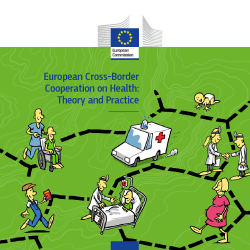
Cross-border cooperation on health firstly aims to facilitate border crossing, that is to say, it encourages the mobility of patients and health professionals. Secondly, it aims to develop access to high-quality health care “at the border”, through the use of common equipment, shared services and joint facilities in the cross-border area. This kind of cooperation is often necessary given the isolation of certain regions. Over time, cross-border cooperation in the field of health has seen numerous initiatives primarily thanks to Interreg funding.
The idea for the publication grew out of this observation. Given the exemplary nature of the Franco-Belgian cooperation on health care and the existence of many other innovative examples across the EU, the authors have aimed to provide a useful insight into the obstacles as well as success factors of health in different geographical contexts. You will find in it several examples of cooperation, all supported by Interreg, varying from the creation of a Franco-Spanish hospital in the mountains allowing ambulances to cross the border to enabling Polish patients to consult a German doctor without even travelling.
In parallel with the roll-out of cross-border cooperation, Europe has seen its role in health policies expand since the early stages of integration. The study outlines the gradual development of the existing European agreements and social security and health regulations guaranteeing the right of citizens' access to cross-border healthcare. Adopted in 2011, the Cross-border Healthcare Directive was a major step forward for European health policy, bringing the EU closer to the needs of citizens. It ensures patients’ rights to access safe and high-quality healthcare across national borders in the EU and their right to be reimbursed of such healthcare.
Particular focus of the study is put on the advanced cooperation at the Franco-Belgian border, which could serve as a benchmark for others. Thanks to the framework agreement on cross-border health cooperation between Belgium and France in 2005, seven areas of organised access to cross-border healthcare were created. The patients in those health zones can receive care on both sides of the border without any administrative or financial barriers. Since 2008, emergency medical services on both sides of the border are also closely working together.
